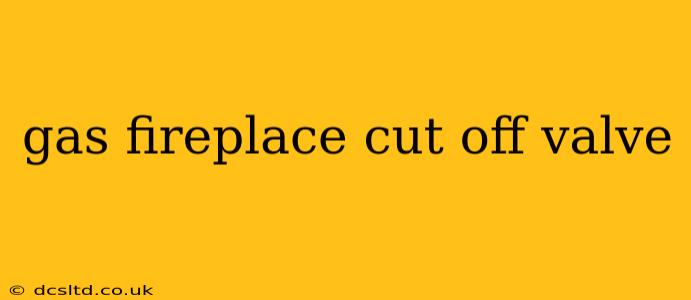A gas fireplace adds warmth, ambiance, and value to your home. But understanding its safety features, especially the cut-off valve, is crucial. This guide will explore everything you need to know about your gas fireplace's cut-off valve, addressing common questions and concerns.
What is a Gas Fireplace Cut-Off Valve?
The gas fireplace cut-off valve is a safety mechanism designed to stop the flow of gas to your fireplace. It's typically located near the fireplace itself, often on the gas line leading to the appliance. This valve is essential for preventing gas leaks and potential hazards, and plays a vital role in ensuring the safe operation of your gas fireplace. There are several types, including manual valves, and those controlled electronically by the fireplace's ignition system.
Where is the Gas Fireplace Cut-Off Valve Located?
The location of your gas fireplace cut-off valve varies depending on the model and installation. However, it's usually situated close to the fireplace, either on the gas line itself or within the fireplace's control panel. Always consult your fireplace's installation manual for the precise location. Attempting to locate it without the manual could lead to unnecessary risks. If you can't find the valve or the manual, contact a qualified gas technician for assistance.
How to Turn Off the Gas Fireplace Cut-Off Valve?
Turning off the valve is straightforward, but always remember to exercise caution. Most manual valves are quarter-turn valves. This means a 90-degree turn will fully open or close the valve. A clockwise turn typically shuts off the gas flow, and a counter-clockwise turn opens it. After turning the valve off, check for any gas leaks using soapy water. If you notice bubbles forming, immediately contact a qualified gas professional.
When Should I Turn Off the Gas Fireplace Cut-Off Valve?
You should turn off your gas fireplace's cut-off valve in several situations:
- Before cleaning or performing maintenance: This prevents accidental gas leaks during the process.
- During extended periods of non-use: This is a good safety precaution to minimize the risk of gas leaks if a malfunction occurs.
- In case of a gas leak or unusual smells: If you detect the smell of gas, immediately turn off the valve and evacuate the premises, contacting emergency services and a qualified gas technician.
- If you're leaving your home for an extended period: This is a simple safety measure to prevent potential issues.
What if My Gas Fireplace Cut-Off Valve is Leaking?
A leaking gas fireplace cut-off valve is a serious safety concern. Do not attempt to repair it yourself. A small leak can escalate quickly, posing a significant fire or explosion hazard. Immediately turn off the valve, evacuate the area, and contact a qualified gas technician to inspect and repair the valve. They possess the expertise and tools to safely address the leak.
How Often Should I Inspect My Gas Fireplace Cut-Off Valve?
Regular inspection is crucial for maintaining the safety of your gas fireplace. While the frequency varies depending on usage and local regulations, it’s advisable to visually inspect the valve at least once a year, checking for signs of damage, corrosion, or leaks.
Can I Replace My Gas Fireplace Cut-Off Valve Myself?
Replacing a gas fireplace cut-off valve is a job best left to a qualified gas technician. Incorrectly replacing or installing the valve can create significant safety hazards, including gas leaks and potential fire risks. The procedure requires specialized knowledge and tools, and only a professional can guarantee a safe and compliant installation.
What are the signs of a faulty gas fireplace cut-off valve?
Signs of a faulty valve may include:
- Gas leaks: The smell of gas, bubbling when soapy water is applied to the valve or connections.
- Difficulty turning the valve: Sticking or excessive resistance when turning the valve.
- Incomplete shut-off: Gas continues to flow even when the valve is turned off.
- Unusual noises: Hissing or whistling sounds from the valve.
Remember, your safety and the safety of your home are paramount. When dealing with gas appliances, it's crucial to prioritize safety and seek professional assistance when needed. A qualified gas technician has the necessary training and expertise to safely handle gas fireplace issues.
